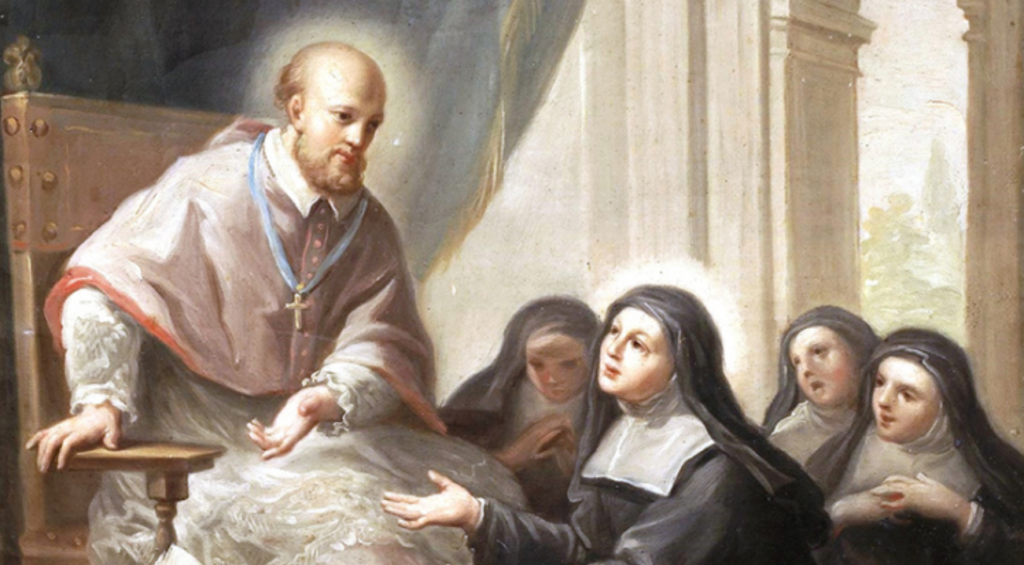
What Does Love Look Like?


416 N 2nd St, Albemarle, NC, 28001 | (704) 982-2910


St. Timothy (1st c.) was born in Galatia in Asia Minor, the son of a Greek father and a Jewish mother. Timothy was a convert of St. Paul the Apostle around the year 47 A.D. Timothy became a trusted friend and a beloved spiritual son to Paul, laboring faithfully alongside him in his apostolic work for many years. Paul mentions Timothy repeatedly in his letters and dispatched him on important missionary work to the local churches he founded. Timothy was ordained to the priesthood at the hands of St. Paul and was later made bishop of Ephesus. St. Timothy was stoned to death thirty years after St. Paul’s martyrdom for having denounced the worship of the false goddess Diana. St. Timothy is the patron of intestinal and stomach problems, because Paul admonished him to ease his penance and drink a little wine for the sake of his health, instead of only water. His feast day is January 26.



Saint Francis de Sales’ Story
Francis was destined by his father to be a lawyer so that the young man could eventually take his elder’s place as a senator from the province of Savoy in France. For this reason Francis was sent to Padua to study law. After receiving his doctorate, he returned home and, in due time, told his parents he wished to enter the priesthood. His father strongly opposed Francis in this, and only after much patient persuasiveness on the part of the gentle Francis did his father finally consent. Francis was ordained and elected provost of the Diocese of Geneva, then a center for the Calvinists. Francis set out to convert them, especially in the district of Chablais. By preaching and distributing the little pamphlets he wrote to explain true Catholic doctrine, he had remarkable success.
At 35, he became bishop of Geneva. While administering his diocese he continued to preach, hear confessions, and catechize the children. His gentle character was a great asset in winning souls. He practiced his own axiom, “A spoonful of honey attracts more flies than a barrelful of vinegar.”
Besides his two well-known books, the Introduction to the Devout Life and A Treatise on the Love of God, he wrote many pamphlets and carried on a vast correspondence. For his writings, he has been named patron of the Catholic Press. His writings, filled with his characteristic gentle spirit, are addressed to lay people. He wants to make them understand that they too are called to be saints. As he wrote in The Introduction to the Devout Life: “It is an error, or rather a heresy, to say devotion is incompatible with the life of a soldier, a tradesman, a prince, or a married woman…. It has happened that many have lost perfection in the desert who had preserved it in the world.”
In spite of his busy and comparatively short life, he had time to collaborate with another saint, Jane Frances de Chantal, in the work of establishing the Sisters of the Visitation. These women were to practice the virtues exemplified in Mary’s visit to Elizabeth: humility, piety, and mutual charity. They at first engaged to a limited degree in works of mercy for the poor and the sick. Today, while some communities conduct schools, others live a strictly contemplative life.
Reflection
Francis de Sales took seriously the words of Christ, “Learn of me for I am meek and humble of heart.” As he said himself, it took him 20 years to conquer his quick temper, but no one ever suspected he had such a problem, so overflowing with good nature and kindness was his usual manner of acting. His perennial meekness and sunny disposition won for him the title of “Gentleman Saint.”
Saint Francis de Sales is the Patron Saint of:
Authors
Deafness
Journalists
Writers
//Franciscan Media//

All morality that was ever developed in any tradition in the world can be reduced to the principle of acting as one acts toward those with whom one belongs. And the differences between the different codes of morality are only the limits that we draw for belonging: “These are the ones toward whom you have to act morally, and the others are ‘the others,’ outside.” And when you really live with common sense, that has no limitations; you live out of a morality that includes everybody, and therefore you behave toward everybody as one behaves when one belongs. That is what Jesus meant when he said “the kingdom of God”—and any other term of that sort that you get from any religious tradition will fit in here.
—from the book The Way of Silence: Engaging the Sacred in Daily Life
by Brother David Steindl-Rast
//Franciscan Media//


